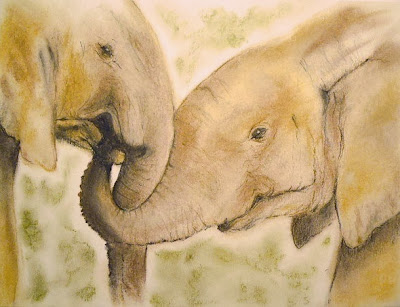In the little music video/slide show thing I did yesterday, there was a photo of a little elephant that my husband Terrence really liked every time it flashed across the screen. (I made him watch the video multiple times, poor fellow.) So today, as a reward for his patience, I thought I'd draw the elephant in charcoal for him.
This is the little elephant he liked.
I decided to use my new Derwent XL Charcoal blocks, which I bought a couple of weeks ago, but hadn't yet used.
I started by doing an outline with the ochre block. I sooo wanted to use a pencil first, but decided to be brave. Despite the size of the blocks, I opted to work on a relatively small sheet of watercolour paper, measuring 9 x 12 inches (22.8 x 30.5 cm).
Once I was happy with the outline, I began adding different colours of charcoal, smudging them in with my fingers. I hate the feel of charcoal on my fingers, but I didn't want the effect you get with a tortillon or blending stump, so fingers it was.
I had originally intended to do the entire drawing with the fat charcoal blocks, but I decided that I liked them better as a sort of colour underlay. To get the fine lines of wrinkles and sharper outlines, I used Derwent pastel pencils, which are also fairly smudgeable. I used the following pastel pencil colours: Ivory Black (67B), Chinese White (72B) and Umber (79B).
As a last touch in each of the elephants, I added a tiny dot of white to the eyes to give them a bit of extra life and sparkle.
The background looked a bit blank when I was done, so I pulled out one of the Derwent XL Graphite Blocks I'd used in an earlier blog post, and swirled in a bit of greenery.
I don't think I'm terribly skilled with charcoal, and I truly dislike having it all over my hands and my clothes, but I like the way this turned out. Hopefully Terrence will like it, too.
Elephant Lore of the Day
While female African elephants usually live in large, tightly knit herds, female Asian elephants were long thought to be antisocial. Asian elephants tend to live in small groups of friends, with few outsiders; however, it was recently discovered that they're actually social butterflies. Not only do they make friends across different groups, but they're also able to maintain strong friendships with elephants they haven't seen in months.According to Sri Lankan behavioural ecologist Shermin de Silva, previous studies involved only captive elephants. Asian elephants are difficult to study in the wild, primarily because they live in dense forests. This meant that researchers could only observe them by clambering up trees and spying on them at water holes.
Recently, however, a population of Sri Lanka's elephants has become more readily observable. Beginning about 30 years ago, their forest was converted to teak plantations, and the region's main river was dammed. As a result, between 800 and 1,200 forest elephants now live on land resembling an East African savannah.
Tracking the relationships of 51 elephants in this group, researchers discovered that Asian elephants don't stick with a single social set. Originally thought to have a maximum of three friends, Asian elephants are now known to have anywhere from 10 to 50 close friends.
The study demonstrates that Asian elephants live in a highly fluid society, leaving and rejoining groups at will. This puts them in the same category as chimpanzees and bottlenose dolphins, and suggests a far greater degree of cognition than previously supposed.
Makes you wonder how many friends they'd rack up on Facebook.
To read the full article, click here.
 |
| Group of Asian elephants. Source: http://www.treehugger.com/natural-sciences/elephant- learns-speak-korean.html |
To Support Elephant Welfare
Boon Lott's Elephant Sanctuary (Thailand)Wildlife SOS (India)
The Elephant Sanctuary (Tennessee)
David Shepherd Wildlife Foundation














No comments:
Post a Comment